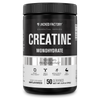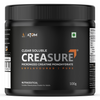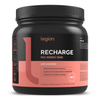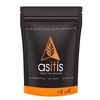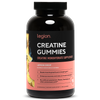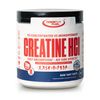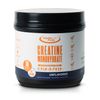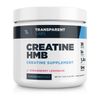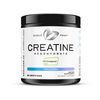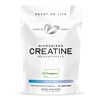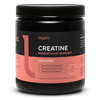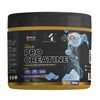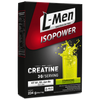CREATINE GUIDE
What is Creatine?
Creatine is a naturally occurring compound that plays a crucial role in providing energy to cells, particularly muscle cells. It is produced in the body from amino acids and is also obtained through dietary sources, primarily meat and fish. Creatine is stored in the muscles and used during high-intensity exercise to generate ATP (adenosine triphosphate), which is the primary energy source for muscle contractions.
How does Creatine work?
When creatine is consumed or synthesized in the body, it binds with phosphate molecules to form phosphocreatine. During intense physical activity, phosphocreatine donates its phosphate group to ADP (adenosine diphosphate), converting it back to ATP and replenishing the energy supply for muscle contractions. This rapid regeneration of ATP allows for increased power output and improved performance during short-duration, high-intensity activities like weightlifting and sprinting.
What are the benefits of Creatine?
Creatine supplementation has been extensively studied and shown to offer several benefits:
- Increased Strength and Power: By enhancing the availability of ATP, creatine supplementation can lead to increased strength and power output during high-intensity exercises. This can benefit athletes participating in activities that require explosive movements, such as weightlifting or sprinting.
- Improved Exercise Performance: Creatine has been shown to improve performance in activities that involve repeated bouts of high-intensity exercise with short recovery periods, such as interval training or sports like soccer and basketball.
- Muscle Mass and Volume: Creatine supplementation can lead to an increase in muscle mass and volume, primarily due to its ability to promote water retention within the muscle cells. This can result in a more significant and fuller appearance of the muscles.
- Enhanced Recovery: Creatine has been suggested to aid in the recovery process following intense exercise. It may reduce muscle damage and inflammation, as well as enhance glycogen resynthesis, allowing for faster recovery and reduced muscle soreness.
- Brain Health: Some research suggests that creatine may have neuroprotective properties and benefits for brain health. It has been investigated for its potential in treating neurological conditions like Parkinson's disease, depression, and cognitive decline.
Is Creatine safe?
Creatine has been extensively researched and is generally considered safe for healthy individuals when taken as directed. It is one of the most well-studied and popular dietary supplements available. However, certain individuals, such as those with pre-existing kidney or liver conditions, may need to exercise caution or consult with a healthcare professional before using creatine.
Can pregnant women take Creatine?
There is limited research on the safety of creatine supplementation in pregnant women. Therefore, it is recommended that pregnant women consult their healthcare providers before using creatine or any other dietary supplements.
Is Creatine safe for children?
The safety of creatine supplementation in children is still a topic of debate and research. While some studies suggest potential benefits, it is important for parents to consult with a pediatrician before considering creatine supplementation for their children.
Is Creatine Vegan?
Creatine itself is a compound that can be found in both animal-based and plant-based sources. However, most commercially available creatine supplements are derived from animal sources, such as meat or fish. For those following a vegan diet, it's crucial to note that not all forms of creatine are vegan-friendly. There are vegan options available, such as creatine monohydrate sourced from fermented plants like corn or beets. It is important to check the product labels or consult with the manufacturer to ensure that the creatine supplement is suitable for vegans.
How much Creatine do you need?
Due to varying medical guidelines concerning dosage, it is highly advised to consume creatine as per the instructions given by your healthcare provider. Individual needs can vary based on factors such as body weight, exercise intensity, and goals.
When should I take my Creatine?
It's typically recommended to take creatine supplements with a meal or after a workout to enhance absorption. However, specific timing may vary based on individual preferences and goals. Following the recommended dosage instructions provided with the product is crucial.
How to store my Creatine?
Creatine should be stored in a cool, dry place, out of reach of children. Always follow the instructions on the supplement bottle.
The information provided in this guide is for educational purposes only and should not replace professional medical advice. Always consult with a healthcare professional before starting any new dietary supplement or exercise program.
SOURCES
Creatine - Mayo Clinic. Accessed in 2023.
The Benefits of Creatine for Building Muscle. Accessed in 2023.
Creatine. Accessed in 2023.
 Jacked Factory Creatine Monohydrate
Jacked Factory Creatine Monohydrate
 AS-IT-IS ATOM Creasure 100% Soluble Creatine Monohydrate
AS-IT-IS ATOM Creasure 100% Soluble Creatine Monohydrate
 Legion Recharge - Unflavored
Legion Recharge - Unflavored
 AS-IT-IS Nutrition Creatine Monohydrate
AS-IT-IS Nutrition Creatine Monohydrate
 Legion Creatine Gummies
Legion Creatine Gummies
 Power Play Fuel Creatine HCL
Power Play Fuel Creatine HCL
 Power Play Fuel Creatine Monohydrate
Power Play Fuel Creatine Monohydrate
 Transparent Labs Creatine HMB
Transparent Labs Creatine HMB
 Muscle Feast Premium Creatine
Muscle Feast Premium Creatine
 Muscle Feast Micronized Creatine Monohydrate (Unflavored)
Muscle Feast Micronized Creatine Monohydrate (Unflavored)
 Legion Micronized Creatine Monohydrate
Legion Micronized Creatine Monohydrate
 Muscle First PRO Creatine
Muscle First PRO Creatine
 L-Men - IsoPower
Upcoming
L-Men - IsoPower
Upcoming

